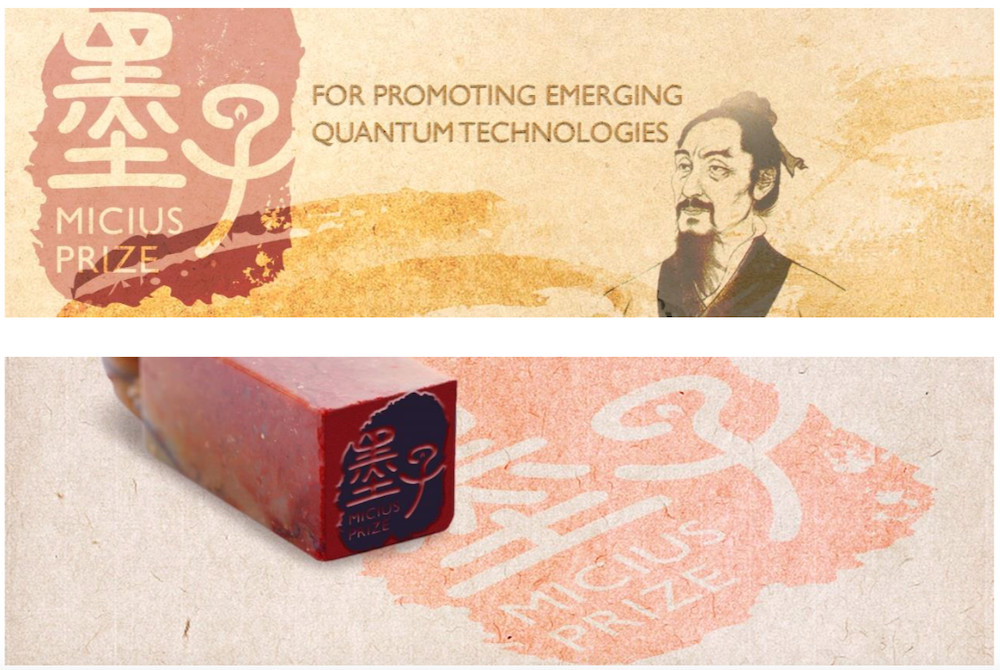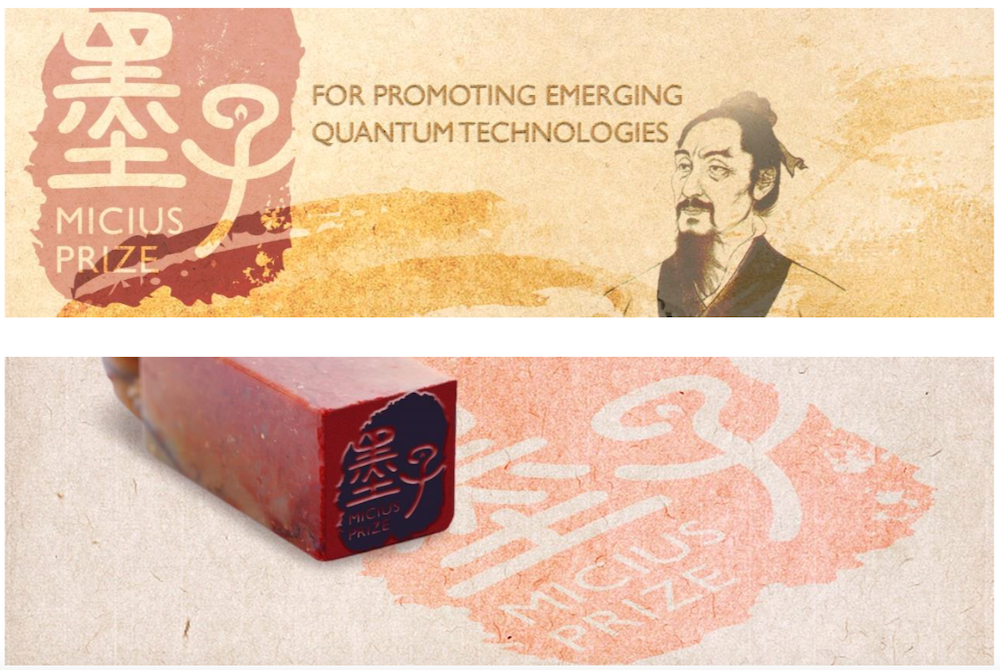
copyright: Micius Prize Office
Quantum mechanics, discovered in the beginning of the last century, has been an enormously successful theory of the nature, and has led to the development of many of today’s most widely used technologies that completely changed the landscape of our society. In past decades, profound progresses, made both in our understanding of exploiting quantum superposition and entanglement for new ways of information processing and in the experimental methods of coherent control and interaction of individual quantum particles, have given birth to an emerging field of quantum technologies, also known as the second quantum revolution, which moved beyond the first quantum revolution that simply exploited naturally occurring quantum effects. The second quantum revolution has been driving and enabling a new generation of classically impossible tasks ranging from unconditionally secure quantum communications, breathtakingly powerful quantum simulation and quantum computation, to extremely sensitive measurements.
To promote the second quantum revolution, a new science foundation, the "Micius Quantum Foundation" has been recently established thanks to generous donations from private entrepreneurs. This Foundation is named after Micius, a Chinese ancient philosopher who lived in the similar period of the Western philosopher Democritus. Micius strongly stood for peace, put forward the concept of "universal love", and performed original scientific work such as the pinhole experiment that proved light traveled straight. His book contained some preliminary idea of Newton's first law of motion, which wrote: "The stop of motion is due to the opposing force... If there is no opposing force... the motion will never stop." Micius also held a belief that objects can infinitely divided into small pieces, but there is a smallest fundamental unit of particle, a concept with coincidence to our modern quantum physics.
One of the important missions of the Micius Quantum Foundation is to establish the “Micius Quantum Prize” to recognize the scientists who have made outstanding contributions in the field of quantum communications, quantum simulation, quantum computation, and quantum metrology. The revenue of the Micius Quantum Foundation is distributed in the form of prizes. Each honoree will receive a prize of one million Chinese yuan (about 150,000 US dollars).
The Micius Quantum Prize recognizes significant science advance ranging from the early conceptual contributions to the recent experimental breakthroughs. The themes of the 2018 and 2019 Micius Quantum Prizes are quantum computation and quantum communications, respectively, which concentrate on those aspects of scientific contributions as following:
Theory category:
quantum algorithms
error correction
implementations of quantum information processing such as quantum computation with trapped ions, quantum simulation with ultracold atoms, and quantum repeaters.
Experimental category:
gates, multiparticle entanglement, quantum simulation, and quantum
computing algorithms using trapped ions.
computing and quantum metrology with trapped ions.
The Micius Quantum Prizes 2019 are awarded to the field of quantum communication. The laureates are Charles Bennett, Gilles Brassard, Artur Ekert, and Stephen Wiesner, for their inventions of quantum cryptography, and Jian-Wei Pan and Anton Zeilinger for their groundbreaking experiments that enabled practically secure and large-scale quantum communications.
Theory category:
discovery of practical quantum cryptography
teleportation, and entanglement purification
entanglement swapping, and entanglement purification
Experimental category:
free-space quantum transmission that enable practically secure and large- scale quantum communications
Selection Committee (2018-2019)
Chair: Professor Chunli Bai (Chair),
President of Chinese Academy of Sciences (CAS) Members:
• Professor Lu-Ming Duan, Tsinghua University Andrew Yao Chair Professor of Tsinghua University
Enrico Fermi Collegiate Professor of University of Michigan
• Professor Yi Luo, University of Science and Technology of China Director of the Hefei National Laboratory of Physical Sciences at Microscale
• Professor Jörg Schmiedmayer, Technische Universität Wien
Chair of the International Conference on Quantum Communication, Measurement and Computing
• Professor Lu Yu, Institute of Physics, CAS Chinese Academy of Sciences
• Professor Fuchun Zhang, University of Chinese Academy of Sciences Director of Kavli Institute for Theoretical Sciences
Director of CAS Center of Excellence on Topological Quantum Computing
• Professor Shiyao Zhu, Zhejiang University Chinese Academy of Sciences
Director of Institute of Optics of Zhejiang University
To promote the second quantum revolution, a new science foundation, the "Micius Quantum Foundation" has been recently established thanks to generous donations from private entrepreneurs. This Foundation is named after Micius, a Chinese ancient philosopher who lived in the similar period of the Western philosopher Democritus. Micius strongly stood for peace, put forward the concept of "universal love", and performed original scientific work such as the pinhole experiment that proved light traveled straight. His book contained some preliminary idea of Newton's first law of motion, which wrote: "The stop of motion is due to the opposing force... If there is no opposing force... the motion will never stop." Micius also held a belief that objects can infinitely divided into small pieces, but there is a smallest fundamental unit of particle, a concept with coincidence to our modern quantum physics.
One of the important missions of the Micius Quantum Foundation is to establish the “Micius Quantum Prize” to recognize the scientists who have made outstanding contributions in the field of quantum communications, quantum simulation, quantum computation, and quantum metrology. The revenue of the Micius Quantum Foundation is distributed in the form of prizes. Each honoree will receive a prize of one million Chinese yuan (about 150,000 US dollars).
The Micius Quantum Prize recognizes significant science advance ranging from the early conceptual contributions to the recent experimental breakthroughs. The themes of the 2018 and 2019 Micius Quantum Prizes are quantum computation and quantum communications, respectively, which concentrate on those aspects of scientific contributions as following:
- Seminal conceptual contributions that opened up the thriving field of quantum communications (including quantum cryptography and quantum teleportation), and/or quantum computation.
- Invention of practical schemes and feasible methods that enabled physical implementations of scalable quantum communications and/or quantum computation.
- Experimental realizations of the fundamental elements of quantum computers, and/or practically secure and large-scale quantum cryptographic networks.
Theory category:
- David Deutsch
quantum algorithms
- Peter Shor
error correction
- Juan Ignacio Cirac
- Peter Zoller
implementations of quantum information processing such as quantum computation with trapped ions, quantum simulation with ultracold atoms, and quantum repeaters.
Experimental category:
- Rainer Blatt
gates, multiparticle entanglement, quantum simulation, and quantum
computing algorithms using trapped ions.
- David J. Wineland
computing and quantum metrology with trapped ions.
The Micius Quantum Prizes 2019 are awarded to the field of quantum communication. The laureates are Charles Bennett, Gilles Brassard, Artur Ekert, and Stephen Wiesner, for their inventions of quantum cryptography, and Jian-Wei Pan and Anton Zeilinger for their groundbreaking experiments that enabled practically secure and large-scale quantum communications.
Theory category:
- Stephen Wiesner
discovery of practical quantum cryptography
- Charles H. Bennett
- Gilles Brassard
teleportation, and entanglement purification
- Artur Ekert
entanglement swapping, and entanglement purification
Experimental category:
- Jian-Wei Pan
- Anton Zeilinger
free-space quantum transmission that enable practically secure and large- scale quantum communications
Selection Committee (2018-2019)
Chair: Professor Chunli Bai (Chair),
President of Chinese Academy of Sciences (CAS) Members:
• Professor Lu-Ming Duan, Tsinghua University Andrew Yao Chair Professor of Tsinghua University
Enrico Fermi Collegiate Professor of University of Michigan
• Professor Yi Luo, University of Science and Technology of China Director of the Hefei National Laboratory of Physical Sciences at Microscale
• Professor Jörg Schmiedmayer, Technische Universität Wien
Chair of the International Conference on Quantum Communication, Measurement and Computing
• Professor Lu Yu, Institute of Physics, CAS Chinese Academy of Sciences
• Professor Fuchun Zhang, University of Chinese Academy of Sciences Director of Kavli Institute for Theoretical Sciences
Director of CAS Center of Excellence on Topological Quantum Computing
• Professor Shiyao Zhu, Zhejiang University Chinese Academy of Sciences
Director of Institute of Optics of Zhejiang University




 IonQ Achieves Industry Leading Performance on Next Generation Barium Qubits
IonQ Achieves Industry Leading Performance on Next Generation Barium Qubits